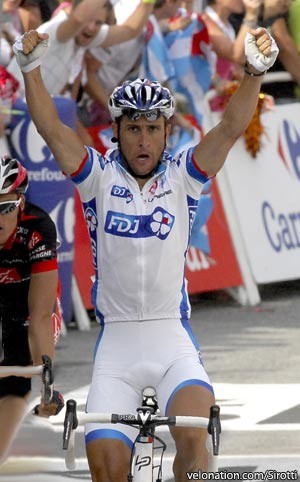FDJ rider looks back at the effect that riding in a doped peloton had on his career
 Sandy Casar (FDJ-BigMat) was touted as a possible great champion of French cycling when he turned professional in 2000. Sadly, this was just the wrong moment for a rider to be entering the peloton, however, as the doped-up US Postal team of Lance Armstrong was taking control of the Tour de France; allegedly forcing many other teams to join in a kind of drugs arms-race.
Sandy Casar (FDJ-BigMat) was touted as a possible great champion of French cycling when he turned professional in 2000. Sadly, this was just the wrong moment for a rider to be entering the peloton, however, as the doped-up US Postal team of Lance Armstrong was taking control of the Tour de France; allegedly forcing many other teams to join in a kind of drugs arms-race.
Having spent 13 seasons in the peloton though, the 33-year-old is most famous for being the brought down by a dog in stage 18 of the 2007 Tour de France. That was to be the first of three stage victories for the rider from the department of Yvelines; although he has only actually stood on the podium twice, since the second one – stage 16 of the 2009 race – was awarded retrospectively after Mikel Astarloza was stripped of the victory after testing positive for EPO.
In an interview with Breton newspaper Ouest France, Casar looked back on a career and wondered what he might have achieved in a clean peloton.
“Could I have been a champion or not?” he asked himself. “You can’t know what what would have happened in races under other circumstances. When a team is doped it can control or block a race; pull back a breakaway. Who knows, maybe sometimes I benefitted from their work without knowing it.
“In fact, everything was distorted,” he added. “Doping was so terrible that we don’t know who was good, and who was not.”
The details of the extent of doping in Armstrong’s team uncovered by the United States Anti-Doping Agency (USADA) – in what was dubbed the “USPS Conspiracy” – amazed even those that knew that they weren’t racing on a level playing field. The legacy of the investigation, for many, has been that all riders are being tarred with the same brush as the disgraced American.
“What shocks me most is the discovery that Armstrong and his cohorts were protected,” said Casar. “I think it’s more serious than the fact that he was cheating himself. We can see quite clearly that the UCI did the minimum to try to stop it.
“Cycling has lost all credibility,” he said. “Whether we are honest or dishonest, nobody believes us.”
While his career has been less successful than it might have been, under different circumstances – having been a member of what the French refer to as the “génération perdue” (the lost generation) – Casar does see hope for young riders, like his FDJ-BigMat teammates Thibaut Pinot, Arthur Vichot and Arnold Jeannesson.
“The current era is much better,” Casar thinks. “Those who have just arrived at professional will be able to win; me, I didn’t know that.
“At the start of my career I thought that I just thought that I didn’t have the level,” he explained. “During my first Flèche Wallonne I took a real beating; in the evening my directeur sportif sent me home, saying it was pointless for me to still do Liège-Bastogne-Liège on the Sunday.
“At the time I was thinking that I’d do two years with the pros and then stop; there was not much else I could do…”